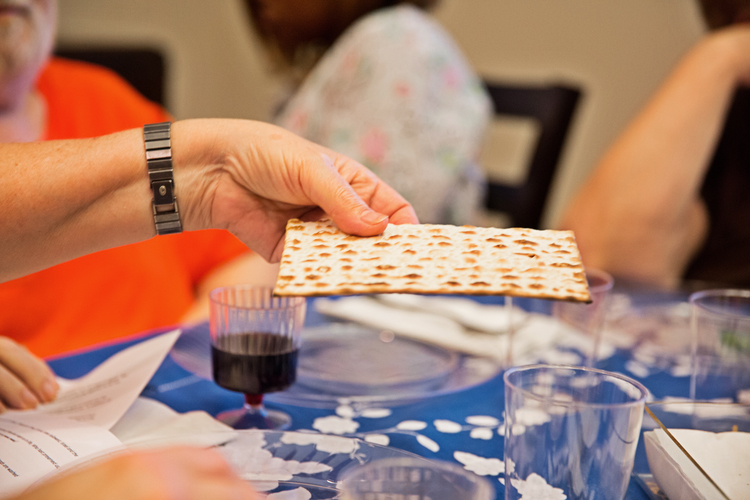
Do You Get a Black Moon?
What is a Black Moon, and why does it happen in December?
During Passover, Jewish people in the UK commemorate the liberation of the Israelites from slavery and their exodus from Egypt.

Passing the matzo. The first day of Passover is marked with the Seder, a feast eaten with close family and friends.
©iStockphoto.com/JodiJacobson
Passover begins on the 15th day of Nisan, the first month of the Jewish calendar. The date falls into March or April in the Gregorian calendar.
While the Passover period lasts for 7 days in Israel, Jewish people in other countries usually observe 8 days of Passover.
The first day of Passover is not a bank holiday in the UK. However, some Jewish businesses and organizations may be closed or offer a reduced level of service during the Passover period.
Like in Jewish communities around the world, the celebration of Passover in the UK traditionally involves a number of rituals, each of which symbolizes a different aspect of the events leading to the exodus of the Israelites from Egypt, as described in the Hebrew Bible.
During Passover, followers of the Jewish faith are forbidden to eat, drink, or own chametz or (chometz)—food that is made from grain (barley, oats, rye, spelt, or wheat) and water and has been allowed to rise. To avoid coming in contact with chametz, people thoroughly clean their homes and living spaces. Objects that cannot be cleaned or destroyed before the start of Passover are usually stored away or temporarily sold to someone who is not Jewish. They are then purchased back after the end of Passover.
Another ritual that is central to the observance of Passover is the seder, a ceremonial meal with family and friends, that is usually held on the first 2 days of Passover. The meal is composed of specific ingredients, which are consumed in a prescribed order, and accompanied by readings from the Haggadah, a book that details the story of the Jewish exodus from Egypt in 14 parts. During the seder, the youngest child of the family is tasked with asking four prescribed questions, which the father answers.
Some Jewish communities in the UK, such as in London and Manchester, organize communal seders. These are held in community halls, synagogues, private homes, or hotels. On or around the first day of Passover, the Prime Minister of the United Kingdom traditionally releases a Passover message.
Passover commemorates the liberation of the Israelites from slavery and their exodus from Egypt, as told in the Hebrew Bible.
Passover is generally celebrated by Jewish people. The United Kingdom is estimated to have the 5th largest Jewish population in the world, with just under 300,000 people practicing the Jewish faith in the country. By far the largest British Jewish community is found in London, followed by those in Manchester and Leeds.
Jewish settlement in England can be traced as far back as the time of the Norman Conquest in 1066. The Jewish community outnumbered the Spanish and Portuguese communities in England by the 18th century.
Many Jewish families in Eastern Europe moved to England to escape persecution and hardship between 1881 and 1914. About 150,000 Jewish people settled in England, with large numbers staying at London's East End during that time. England continued to receive Jewish immigrants escaping persecution around the time of World War II (1939-1945).
In the Jewish diaspora—Jewish communities outside of Israel—an extra day is usually added to religious observances, with the exception of Yom Kippur, which lasts only one day worldwide, and Rosh Hashana, which is celebrated over two days in both Israel and the diaspora.
This custom has its roots in ancient times when the beginning of the months in the Jewish calendar still relied on the sighting of the crescent Moon following a New Moon.
The beginning of a new month was determined by the Sanhedrin, the supreme court of ancient Israel in Jerusalem. Once the date was published, messengers were dispatched to spread the news among Jews living abroad. Since this process took some time, it was decreed that Jews outside of ancient Israel were to observe every holiday for 2 days to make sure that the rules and customs applicable to each holiday were observed on the proper date. This rule is still observed today.
Note: Jewish holidays begin at sundown the day before the date specified for the holiday.
| Year | Weekday | Date | Name | Holiday Type |
|---|---|---|---|---|
| 2019 | Sat | Apr 20 | First day of Passover | Jewish Holiday |
| 2020 | Thu | Apr 9 | First day of Passover | Jewish Holiday |
| 2021 | Sun | Mar 28 | First day of Passover | Jewish Holiday |
| 2022 | Sat | Apr 16 | First day of Passover | Jewish Holiday |
| 2023 | Thu | Apr 6 | First day of Passover | Jewish Holiday |
| 2024 | Tue | Apr 23 | First day of Passover | Jewish Holiday |
| 2025 | Sun | Apr 13 | First day of Passover | Jewish Holiday |
| 2026 | Thu | Apr 2 | First day of Passover | Jewish Holiday |
| 2027 | Thu | Apr 22 | First day of Passover | Jewish Holiday |
| 2028 | Tue | Apr 11 | First day of Passover | Jewish Holiday |
| 2029 | Sat | Mar 31 | First day of Passover | Jewish Holiday |
While we diligently research and update our holiday dates, some of the information in the table above may be preliminary. If you find an error, please let us know.

What is a Black Moon, and why does it happen in December?

When will the next comet be visible?

Why do mornings keep getting darker after the December solstice?

Boxing Day is a holiday in the United Kingdom that falls on December 26 each year.